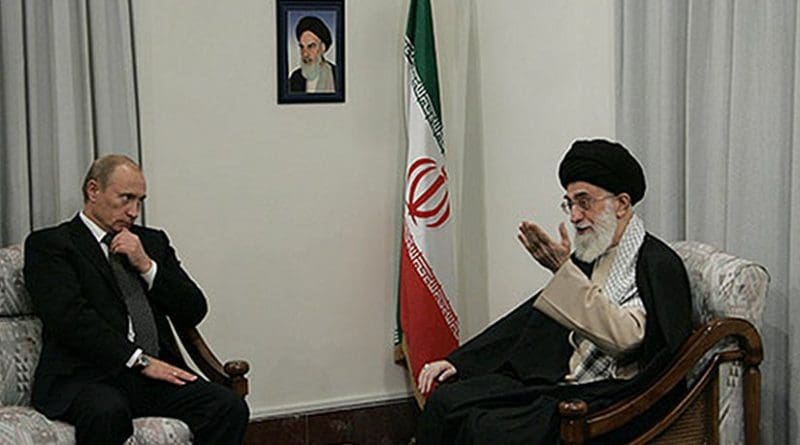Iran’s Regional Agenda Threatened By Astana Process – OpEd
By Arab News
By Osama Al-Sharif*
Those who had hoped that the proposed peace talks on Syria, which opened in the Kazakh capital on Monday, would stumble at the last minute may feel miffed. They include a desperate Syrian regime, its main backer Iran, and a number of hard-line opposition groups.
The two-day talks, co-sponsored by Moscow and Ankara, represent a serious attempt to seek a political settlement to the six-year bloody war in Syria, which has claimed the lives of hundreds of thousands, displaced millions, and left more than a third of the country in ruins.
The convening of the Astana talks, in the presence of a regime delegation and one representing most opposition groups, is a major political victory for the evolving Russian-Turkish alliance. The meeting will seek to bolster last month’s fragile cease-fire, and approve a series of agreements to facilitate the provision of humanitarian aid, especially to besieged areas.
Behind this accelerating process is Russia and its President Vladimir Putin. He has emerged as the main power broker in Syria, having intervened militarily more than a year ago to rescue the regime of President Bashar Assad, but realizing that an open-ended civil war is no longer an option.
For Iran — which has dispatched tens of thousands of its Revolutionary Guards, backed by Hezbollah, in addition to Shiite fighters from Iraq and Afghanistan — the stakes in Syria are too high to let go. Tehran’s support for the Assad regime exceeds the declared objectives of backing legitimacy, fighting terrorism and liberating the entire Syrian territory.
It is an integral part of a sectarian scheme that seeks to extend Tehran’s influence over much of Iraq and Syria, altering demographic realities there and securing a permanent presence in both countries. Moscow’s intervention in Syria, and subsequent control by Russia of the Syrian dossier, threaten such plans.
Furthermore, Turkey’s recent breakthrough as a sponsor and guarantor of the truce in Syria is a major source of concern for Tehran’s ardent rulers. Ankara’s close relationship with, and influence over, opposition groups is an essential component in the Russian-Turkish understanding on Syria. Both have important cards to play in moving toward a final political settlement that will eventually allow the Syrian people to decide their own destiny.
In the long run, both Ankara and Moscow believe that once a transitional phase has begun — in accordance with Geneva I principles and UN resolutions, particularly Resolution 2254 — Assad’s role will have to be negotiated at some stage. Tehran will not accept this.
Putin and Turkish President Recep Tayyip Erdogan have more in common today, in terms of their regional outlook, than do Russia and Iran. The latter remains a pariah state with mounting evidence that it has become a destabilizing force in Iraq, Syria, Yemen and the Arabian Gulf.
The incoming US administration is openly hostile toward Tehran, and President Donald Trump will seek closer cooperation with Moscow and Ankara mainly to confront Daesh. He is unlikely to challenge Moscow’s political efforts in Astana and beyond.
On the other hand, the Syrian opposition is beginning to understand the changing geopolitical realities in the region, and will seek to re-evaluate its position on various issues in order to remain relevant and engaged in the political process. It now views Russia’s role as positive, with the head of the Syrian opposition delegation claiming that Moscow is trying to play a neutral role in Astana. Those who abandon the talks risk being cast as terrorist groups.
For Putin, Russia’s strategic objectives following its incursion have mostly been met. Moscow now has significant naval and air bases in Syria. Furthermore, America’s untidy withdrawal from the region under former President Barack Obama has allowed Russia to become a major regional player.
It maintains good working relations with the Gulf countries, Egypt, Jordan and Israel. Putin is even pushing for a new role in war-torn Libya, and Moscow is attempting to mediate between Palestinian factions.
Russia’s resurgence is bound to clash with Iran’s regional ambitions, particularly in Syria. The two agendas will collide sooner rather than later. However, Tehran can still sabotage the budding political process in Syria. Its power over the Assad regime remains considerable. Assad must now decide if he wants to turn Syria into a client state for Iran, with its sinister agenda, or embark on a long and arduous path toward a peaceful and all-inclusive settlement.
Both the regime and the opposition will have to be encouraged to make meaningful, even painful compromises if they want to end the bloodbath in Syria. This is where Russian-Turkish mediation becomes especially important as the two warring sides succumb to exhaustion after six grueling years.
Astana is but a small step forward in a long and unpredictable journey in search of a workable political settlement in Syria. It is a complicated process, especially as some opposition groups refuse to join while Turkey insists on excluding Syria’s Kurds.
However, it is encouraging that both Moscow and Ankara appear adamant on preserving the current cease-fire and blocking a return to military confrontations. Iran may not be pleased with the Russian-Turkish attempt to launch a political process, but it can do little to stop it — for now.
* Osama Al-Sharif is a journalist and political commentator based in Amman.

